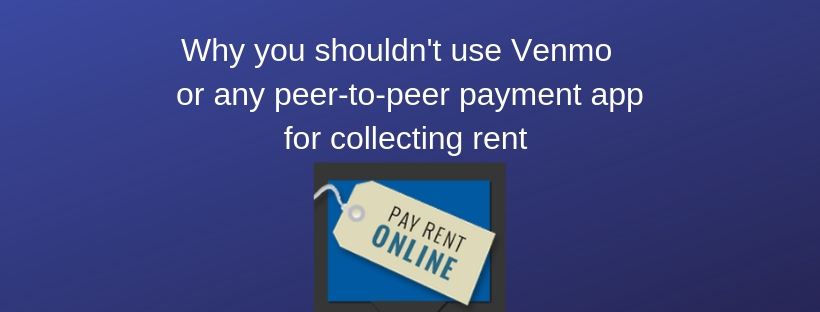Online rent collection is a better option.
Many landlords I speak to still collect paper checks for rent payments. They are beginning to realize this is an antiquated and cumbersome process. And, most tenants will tell you that they absolutely detest paying their rent with a paper check. This is especially applies to those under the age of 50.
There are a number of electronic rent collection options. Peer-to-peer payments is one of the newer methods. Venmo and Zelle are two of the more popular apps. Zelle will not work for most landlords as it has transaction limits of $500 unless your bank is registered.
Many landlords accept Venmo for rent payments. The problem is that Venmo does not permit it to be used for business transactions
Their site specifically states – “Venmo may not otherwise be used to receive business, commercial or merchant transactions, meaning you CANNOT use Venmo to accept payment from (or send payment to) another user for a good or service.”
Venmo further warns – “If you accept a Venmo payment from someone for a good or service and we later review the payment, we may reverse the payment, meaning you could lose both the payment and the item sold. This review process may not occur until after you attempt to transfer the funds out of Venmo.”
There are other reasons why you should not use Venmo or other peer-to-peer apps for rent payments.
Venmo and most other peer-to-peer payment apps do not allow landlords to set the minimum payment amount that will be accepted. This can be an issue if the tenant sends a partial payment that is automatically accepted. In most states, accepting partial rent prevents the landlord from charging late fees and proceeding with an eviction. Some states will not permit landlords to collect the remainder of the rent.
Peer-to-peer payment apps also lack reporting features. If you are treating your rental properties like a business, it is crucial to be able to track rent payment details for accounting and tax reporting.
The best option for replacing paper checks for both landlords and tenants is online rent collection. Landlords can have invoices automatically emailed to tenants. These rent payments can then be directly deposited to the landlord’s bank account.
Tenants and landlords can also set up a recurring payments. Each month the tenant’s account is debited for the rent payment and automatically deposited into the landlord’s account.
When choosing an online rent collection program, make sure it has the ability to assess late fees on whatever day of the month you choose. Other important features include detailed account and transaction reporting and not accepting partial payments.
Obviously, cost should be taken into consideration. At TenantMagic, we use Singular Payments which meets all of the requirements I mentioned and costs the tenant a $1.00 convenience fee per rent payment. There is no cost to the landlord. For more information or to register, contact Walter Richardson walter.richardson@singularpayments.com.
Jay Apple is Co-founder of TenantMagic www.tenantmagic.net, an online rental application and screening program for residential real estate.
japple@tenantmagic.net
